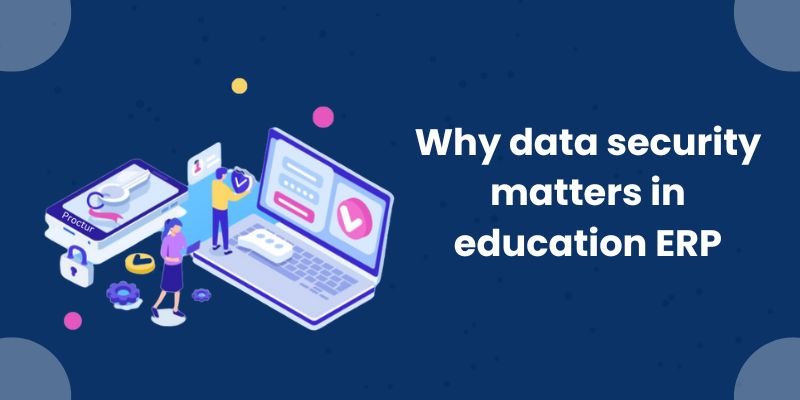From admissions and attendance to fee payments and feedback, schools today operate largely through cloud-based ERP systems. These platforms manage massive volumes of sensitive data: names, addresses, Aadhaar numbers, financial transactions, grades, attendance logs, and even biometric and health details.
In essence, your school’s ERP is now the nervous system of your institution.
But here’s the problem — while digitization has brought incredible convenience and efficiency, it has also opened the door to serious vulnerabilities.
Unfortunately, many school leaders don’t realize this until it’s too late.
In 2025, if your ERP system isn’t secure, you’re not just risking downtime. You’re risking student safety, legal consequences, and reputational damage.
Let’s break down why data security in education ERP isn’t just a tech issue — it’s a leadership priority.
The Types of Data Schools Handle
To understand the risk, we must understand the data.
A school ERP typically stores:
- Personally identifiable information (PII): names, addresses, contact numbers, date of birth, Aadhaar/passport IDs
- Academic records: test scores, teacher feedback, disciplinary logs
- Health data: allergies, disabilities, vaccinations
- Financial records: fee payments, receipts, payroll, scholarships
- Behavioral data: attendance, login timestamps, device usage
- Communication logs: emails to parents, internal messages
Every piece of this is gold for hackers — and a liability if mishandled.
Real Risks: What Can Go Wrong?
1. Student Exploitation
Stolen student data can be used for phishing, scams, identity theft, or worse — putting children at real risk.
2. Financial Fraud
Unsecured fee portals or compromised admin logins can lead to massive financial theft — not just from the school but from unsuspecting parents.
3. Data Manipulation
Tampering with marksheets, attendance records, or admission rankings is surprisingly common in poorly protected systems.
4. Legal Action
As India moves toward stronger data protection laws (like the Digital Personal Data Protection Act), schools that fail to comply will face steep fines, suspension, or public litigation.
5. Reputational Damage
Parents entrust you with their child’s data. A breach doesn’t just hurt operations — it destroys trust. And that can take years to rebuild.
Why Many School ERP Fail on Security
The unfortunate truth? Most ERPs built for education were designed with functionality in mind — not security.
Red flags include:
- Outdated server infrastructure
- No encryption of data in transit or at rest
- Weak or shared passwords among staff
- No audit trails to track unauthorized access
- Lack of cloud backups or disaster recovery plans
- No compliance with ISO, GDPR, or Indian data protection standards
Even worse — some schools continue to run ERPs on local servers or outdated software, making them easy prey for ransomware attacks.
What a Secure School ERP Should Offer
When evaluating or upgrading your ERP, these features are non-negotiable:
1. End-to-End Encryption
All data must be encrypted — whether stored on a server, sent over the internet, or viewed by a user.
2. Role-Based Access Control
Not every user should see everything. Teachers should access only their own students. Accountants only financial data. Parents only their child’s records.
3. Real-Time Monitoring & Alerts
A good ERP will flag unusual behavior: failed login attempts, access at odd hours, or data exports that shouldn’t be happening.
4. Regular Security Audits
Vendors must conduct penetration tests, patch vulnerabilities, and prove compliance through certifications.
5. Cloud Backups & Disaster Recovery
If your system goes down or is attacked, your data must be recoverable — instantly.
6. Compliance Readiness
Make sure the ERP vendor meets ISO/IEC 27001, GDPR guidelines, and Indian DPDP requirements.
Why This Matters More Than Ever in 2025
Cyberattacks targeting educational institutions have skyrocketed globally. Why?
Because schools are soft targets with high-value data and minimal security budgets.
With hybrid learning, increased cloud dependency, and digital-first operations, schools can no longer afford to treat cybersecurity as a side issue.
It’s time for education leaders — not just IT teams — to own this responsibility.
VAPS ERP: Built for Security from the Ground Up
At VAPS, we’ve been building education ERP systems for over two decades — with security at the core.
Here’s what sets us apart:
- Enterprise-grade encryption protocols
- Secure authentication (2FA, biometric, OTP)
- Zero-trust architecture with layered access
- Cloud hosting with 99.99% uptime and auto backup
- Indian and global compliance readiness
- Dedicated data privacy dashboard for admins
We don’t just sell features. We sell peace of mind.
Your school deserves technology that empowers — not endangers.
What School Leaders Must Do Today
- Audit your current ERP — what security layers are in place?
- Train your staff — data leaks often begin with human error.
- Set clear protocols — for access, backups, and breach reporting.
- Invest in a partner, not just a product — work with vendors who take security as seriously as you do.
- Talk to your parents — make them part of your data safety journey.
Data Security Is Student Safety
A school’s first job is to protect its students.
And in 2025, that includes protecting their data.
Your ERP is the foundation of your operations — but also of your reputation, trust, and legal safety.
Don’t wait for a breach to take this seriously.
Choose an ERP built not just for features, but for fortress-level security.
Because when it comes to our children, privacy is not optional. It’s the minimum.
